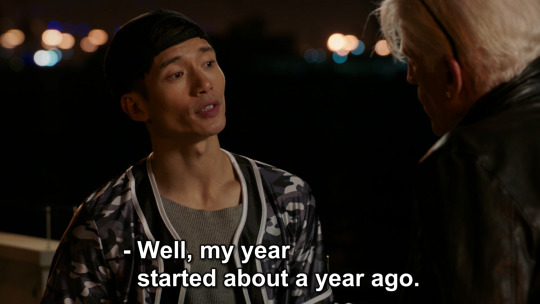reblog blog. anything and everything except original thoughts. main: sing-you-fools
Don't wanna be here? Send us removal request.
Text
the only things i know about jimmy carter are:
-he looked straight up dead when he turned 100 and voted early cos he was straight up dead and now he's actually dead dead
-was president during the three mile island reactor partial meltdown incident and because he had worked on nuclear subs before he knew that shit was fine and went over there to be like lalala i <3 reactors while the media were shitting their britches over a teeny tiny amount of radiation
10K notes
·
View notes
Text
Reblog daily for health and prosperity

31K notes
·
View notes
Text
experimenting with food is so scary like what if this sucks ass and now i gotta eat it anyway or i'll starve
#i will TRY just about any food#but i will not be the one to order it#no i'm ordering something i'm pretty sure i'll like#if you want me to try it so bad YOU order it. and give me a bite.#cooking at home gets more complicated#i'm pretty good at picking out recipes i'll like but hesitant to try completely new flavors#especially since then it's like. well now i have a whole bottle of this nasty shit
13K notes
·
View notes
Text
hey honest question, did anybody have GOOD stuff happen to them in 2024? cause it was really bad for me and for most people i know, so it would be nice to hear about anything that's been going WELL for any of you. even if it's small stuff. just to know there's light out there.
#it's so weird when a year is Generally Bad but Personally Good but that was 2024 for me#unfucked some stuff that really needed unfucking#had fun times with the kid#made art i'm proud of#tried to ignore the horrors
18K notes
·
View notes
Text
Cybertruck blew up outside Trump's hotel in Vegas. Wild footage, I've never seen an EV flat-out detonate like that and I'm thinking that it wasn't the battery.
48K notes
·
View notes
Text








Favourite Designs: Maquinn "Rebirth" Spring 2025 Haute Couture Collection
2K notes
·
View notes
Text

#laugh rule#wishbone#still salty that somehow every single time i caught wishbone as a kid it was the exact same episode (the tempest)#kids these days have no idea how lucky they are with streaming
7K notes
·
View notes
Text
this callout couldve been a block button
68K notes
·
View notes
Text

my god i just imagined if hatset had walked in on that
151 notes
·
View notes
Text
crazy how people assume trans guys dont know if we had short naturally coloured hair and a basic style we'd "pass better." "you want tips on how to pass? no more fun piercings, jewelry, anything feminine, dyed hair, nail polish or nice things for you!" thanks but I choose joy and whimsy x
43K notes
·
View notes
Text
In general, understanding radical feminism for what it is and why it appeals to many people requires an understanding that the greatest strength of radical feminism as a tool for understanding misogyny and sexism is also its greatest faultline.
See, radical feminism is a second wave position in feminist thought and development. It is a reaction to what we sometimes call first wave feminism, which was so focused on specific legal freedoms that we usually refer to the activists who focused on it as suffragists or suffragettes: that is, first wave feminists were thinking about explicit laws that said "women cannot do this thing, and if they try, the law of the state and of other powerful institutions will forcibly evict them." Women of that era were very focused on explicit and obvious barriers to full participation in public and civil life, because there were a lot of them: you could not vote, you could not access education, you could not be trained in certain crucial professions, you could not earn your own pay even if you decided you wanted to.
And so these activists began to try to dig into the implicit beliefs and cultural structures that served to trap women asking designated paths, even if they did wish to do other things. Why is it that woman are pressured not to go into certain high prestige fields, even if in theory no one is stopping them? How do our ideas and attitudes about sex and gender create assumptions and patterns and constrictions that leave us trapped even when the explicit chains have been removed?
The second wave of feminism, then, is what happened when the daughters of this first wave--and their opponents--looked around and said to themselves: hold on, the explicit barriers are gone. The laws that treat us as a different and lesser class of people are gone. Why doesn't it feel like I have full access to freedoms that I see the men around me enjoying? What are the unspoken laws that keep us here?
And so these activists focused on the implicit ideas that create behavioral outcomes. They looked inward to interrogate both their own beliefs and the beliefs of other people around them. They discovered many things that were real and illuminated barriers that people hadn't thought of, especially around sexual violence and rape and trauma and harassment. In particular, these activists became known for exercises like consciousness-raising, in which everyday people were encouraged to sit down and consider the ways in which their own unspoken, implicit beliefs contributed to general societal problems of sexism and misogyny.
Introspection can be so intoxicating, though, because it allows us to place ourselves at the center of the social problems that we see around us. We are all naturally a little self centered, after all. When your work is so directly tied to digging up implications and resonances from unspoken beliefs, you start getting really into drawing lines of connection from your own point of interest to other related marginalizations--and for this generation of thinkers, often people who only experienced one major marginalization got the center of attention. Compounding this is the reality that it is easier to see the impacts of marginalization when they apply directly to you, and things that apply to you seem more important.
So some of this generation of thinkers thought to themselves, hang on. Hang on. Misogyny has its fingers in so many pies that we don't see, and I can see misogyny echoing through so many other marginalizations too--homophobia especially but also racism and ableism and classism. These echoes must be because there is one central oppression that underlies all the others, and while theoretically you could have a society with no class distinctions and no race distinctions, just biologically you always have sex and gender distinctions, right? So: perhaps misogyny is the original sin of culture, the well from which all the rest of it springs. Perhaps there's really no differences in gender, only in sex, and perhaps we can reach equality if only we can figure out how to eradicate gender entirely. Perhaps misogyny is the root from which all other oppressions stem: and this group of feminists called themselves radical feminists, after that root, because radix is the Latin word for root.
Very few of this generation of thinkers, you may be unsurprised to note, actually lived under a second marginalization that was not directly entangled with sexism and gender; queerness was pretty common, but queerness is also so very hard to distinguish from gender politics anyway. It's perhaps not surprising that at this time several Black women who were interested in gender oppression became openly annoyed and frustrated by the notion that if only we can fix gender oppression, we can fix everything: they understood racism much more clearly, they were used to considering and interrogating racism and thinking deeply about it, and they thought that collapsing racism into just a facet of misogyny cheapened both things and failed to let you understand either very well. These thinkers said: no, actually, there isn't one original sin that corrupted us all, there are a host of sins humans are prone to, and hey, isn't the concept of original sin just a little bit Christianocentric anyway?
And from these thinkers we see intersectional feminists appearing. These are the third wave, and from this point much mainstream feminist throughout moves to asking: okay, so how do the intersections of misogyny make it appear differently in all these different marginalized contexts? What does misogyny do in response to racial oppression? What does it look like against this background, or that one?
But the radical feminists remained, because seeing your own problems and your own thought processes as the center of the entire world and the answer to the entire problem of justice is very seductive indeed. And they felt left behind and got quite angry about this, and cast about for ways to feel relevant without having to decenter themselves. And, well, trans women were right there, and they made such a convenient target...
That's what a TERF is.
Now you know.
4K notes
·
View notes
Text
The first three words you see will manifest in 2025.

#lesbian portal adventure#so when my husband and i fall through a door to narnia or wherever#i will have to ask him if there's something she would like to tell me
10K notes
·
View notes
Text
"AGAB is only relevant in medical contexts so-" NO.
The point of centering that it's ASSIGNED is to highlight that it's medically imprecise! The thing that is relevant in medical contexts is your actual biological status, anatomy and hormone levels included! Birth gender assignment is social!
It's not useful for deciding how to treat individuals in a medical or social context. For both of those you work off their current relevant traits, for which AGAB is necessarily a bad proxy in spaces with trans and intersex people!
The primary use of birth gender assignment is to understand how it influences societal forces affecting the person. AGAB is not "true biological sex but more progressive". You cannot create a conception of True Biological Sex that is progressive.
5K notes
·
View notes


